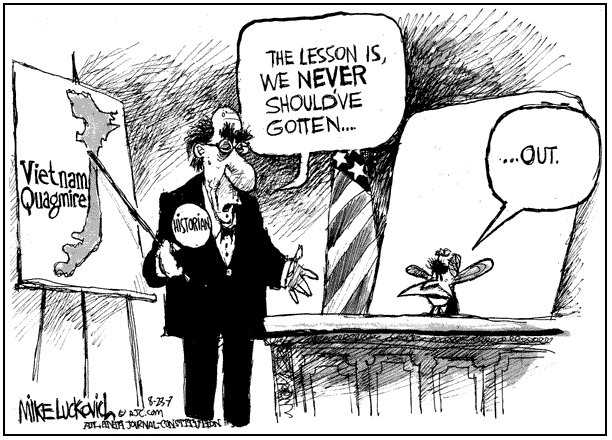Search
Recent comments
- mossad.....
10 hours 7 min ago - palantir...
11 hours 18 min ago - reckoning....
11 hours 43 min ago - RBA BS...
12 hours 14 min ago - clintons to testify....
12 hours 18 min ago - all in it.....
16 hours 39 min ago - friends for peace.....
19 hours 16 min ago - growing.....
19 hours 26 min ago - the epstein sewer....
1 day 6 hours ago - not ready?....
1 day 6 hours ago
Democracy Links
Member's Off-site Blogs
so much for winston .....

While turd blossom attempts to justify his folly in Iraq by fabricating the outcome of amerika’s earlier foreign policy disaster in Vietnam, there are still those who think it wiser to learn from history, rather than ignore it.
'"When Iraq becomes strong enough in our opinion to stand alone, we shall be in a position to state that our task has been fulfilled, and that Iraq is an independent sovereign state. But this cannot be said while we are forced year after year to spend very large sums of money on helping the Iraqi government to defend itself and maintain order.”
Sound familiar? Perhaps like something you’ve heard from a stay-the-course advocate, circa 2004-7? Nope, it’s Winston Churchill, writing in 1922 as head of Britain’s Colonial Office. At the time, Prince Feisal - whom Churchill had appointed king of the nascent nation of Iraq, whose borders Churchill had drawn up the previous year - was balking at the protectorate agreement the British wanted. To rule a land and people with whom he was largely unfamiliar, Feisal, a native of the Arabian Peninsula and not the land between the Tigris and Euphrates, and who had spent much of his life in Turkish Constantinople, needed legitimacy - and as much independence from the British as he could get.
That, and the above quote, are just two among endless parallels between the British experience in Iraq and the American experience 80-plus years later - as reported in Churchill’s Folly, by historian Christopher Catherwood (2004, Carroll & Graf). It wasn’t written yet when the Bush administration invaded Iraq in 2003, but the information was there for the learning if anyone in the White House had cared to pursue it. E-mail subject: Things To Avoid in Iraq! For this book, Catherwood relies heavily on the archived letters and memos written by the remarkably prolific Churchill.’
- By John Richardson at 27 Aug 2007 - 6:56am
- John Richardson's blog
- Login or register to post comments
Vietnam Katrina from the AWOL kid
From The Washington Post
Reckless Abandonment
By Douglas Brinkley
Sunday, August 26, 2007; B01
Over the past two years since Hurricane Katrina, I've seen waves of hardworking volunteers from nonprofits, faith-based groups and college campuses descend on New Orleans, full of compassion and hope.
They arrive in the city's Ninth Ward to painstakingly gut houses one by one. Their jaws drop as they wander around afflicted zones, gazing at the towering mounds of debris and uprooted infrastructure.
After weeks of grueling labor, they realize that they are running in place, toiling in a surreal vacuum.
Two full years after the hurricane, the Big Easy is barely limping along, unable to make truly meaningful reconstruction progress. The most important issues concerning the city's long-term survival are still up in the air. Why is no Herculean clean-up effort underway? Why hasn't President Bush named a high-profile czar such as Colin Powell or James Baker to oversee the ongoing disaster? Where is the U.S. government's participation in the rebuilding?
And why are volunteers practically the only ones working to reconstruct homes in communities that may never again have sewage service, garbage collection or electricity?
Eventually, the volunteers' altruism turns to bewilderment and finally to outrage. They've been hoodwinked. The stalled recovery can't be blamed on bureaucratic inertia or red tape alone. Many volunteers come to understand what I've concluded is the heartless reality: The Bush administration actually wants these neighborhoods below sea level to die on the vine.
Denial by choice
Selective Amnesia
The pundits who sold the Iraq War change their tune and bury their records.
by Glenn Greenwald
When political leaders make drastic mistakes, accountability is delivered in the form of elections. That occurred in November when voters removed the party principally responsible for the war in Iraq. But the invasion would not have occurred had Americans not been persuaded of its wisdom and necessity, and leading that charge was a stable of pundits and media analysts who glorified President Bush’s policies and disseminated all sorts of false information and baseless assurances.Yet there seems to be no accountability for these pro-war pundits. On the contrary, they continue to pose as wise, responsible experts and have suffered no lost credibility, prominence, or influence. They have accomplished this feat largely by evading responsibility for their prior opinions, pretending that they were right all along or, in the most extreme cases, denying that they ever supported the war....
-------------